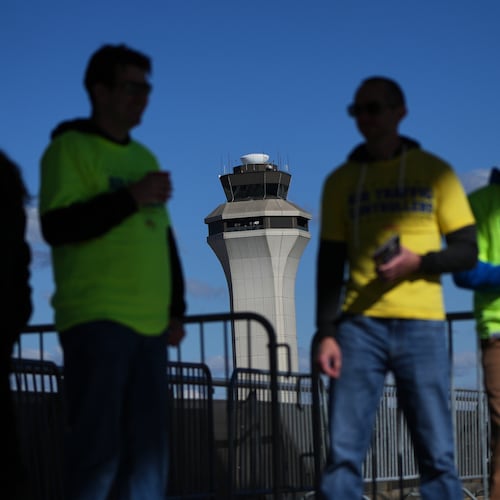Tuesday marks the first zero paycheck day for the nation’s air traffic controllers.
Members of the National Air Traffic Controllers Association union are distributing leaflets about the shutdown’s effects at nearly two dozen airports to raise awareness, including Atlanta.
Maximilian Crawford, a controller at the FAA’s air traffic control facility in Peachtree City, handed out leaflets all day at the Atlanta airport. He said morale “could be better. It sucks that we’re not getting paid.”
It “adds another distraction, increasing risk inside the operation that’s just not needed or wanted.”
While Atlanta’s four air traffic control sites haven’t yet seen a severe operational effect from a staffing crunch, Dan McCabe, the union’s southern regional vice president, said it’s only a matter of time before that happens.
Back in 2019, air travel disruption caused by callouts of unpaid air traffic controllers was instrumental in increasing pressure on politicians to end a 35-day federal government shutdown.
“It’s a waiting game,” McCabe said. The union has about 600 members across metro Atlanta.
“It’s so sad. I’ve already gotten phone calls of people working side jobs around the region. Waiting tables. Uber. DoorDash.”
Credit: Ben Hendren
Credit: Ben Hendren
Some are setting up carpools to try to pool gas money to get to work, he said. Organizations, including Delta Air Lines and the Air Line Pilots Association union, have donated meals.
“It’s bad,” McCabe said. “Now we’ve got to figure out what the breaking point is going to be. And that’s an impossible task, because you don’t know what anyone’s dealing with in their personal life … what their financial situation is.”
McCabe said he’s had a few Atlanta-area controllers call to tell him they’re considering getting different jobs to help pay their bills.
After the last government shutdown in 2019, controller Rafael Naveira, who works at the Peachtree City facility, started building up a “government shutdown fund” for himself and his family.
That’s been paying off these last few weeks.
“But you know, it’s not indefinite. It’s not gonna last forever. I have already had a discussion with my wife about if we have to start cutting down on things,” he said while handing out leaflets Tuesday.
“I feel like I’m a bargaining chip or even a hostage,” he said. “The job is hard enough as it is.”
Credit: Ben Hendren
Credit: Ben Hendren
One very new employee recently asked McCabe “how they could potentially take a leave of absence to go get a job that actually pays them, because they are unable to make ends meet right now,” he said.
“That stuff is just sad.”
Air traffic controllers go through years of rigorous, high-stress training for a very technical job.
Atlanta-area controllers’ pay scale starts at nearly $58,000 and maxes out at about $218,000 based on experience.
Given a nationwide controller shortage, it’s common to see 48-60 working hours per week, 10-hour days and six-day weeks, he said.
“It’s a bad situation. And at this point, it is getting worse and worse and worse and worse,” McCabe said.
“We’re playing it day by day,” Crawford said of Atlanta-area staffing.
“We’re showing up to work. We just hope our elected officials … get back to Washington and do their job.”
Before the shutdown, there had been some momentum toward the immense task of revolutionizing the antiquated, understaffed system.
“It’s not like the shutdown is the only thing going on,” McCabe said.
But now, it takes the front seat.
“That’s always been one of the big problems on the back side of a shutdown. You don’t understand just how much stuff fell through the cracks until you’re on the back side,” he said.
Recruiting is a key worry.
“What I really don’t want to happen is people who walk away from a good career from a circumstance that’s out of their control,” he said.
“We need people. There’s been a lot of effort into expanding the ranks. And this does everything but.”
Credit: Ben Hendren
Credit: Ben Hendren
About the Author
Keep Reading
The Latest
Featured


